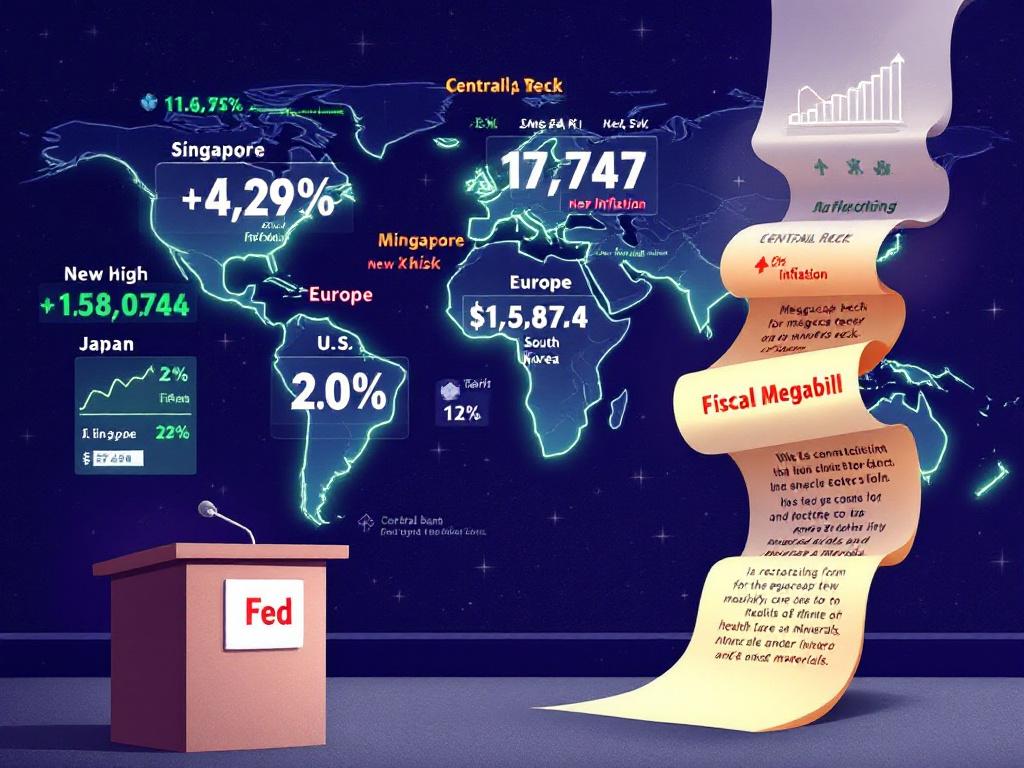Articles in this Cluster
02-07-2025
Asia-Pacific markets were mixed as investors reacted to Fed Chair Jerome Powell’s comment that rates would have been cut if not for President Trump’s tariff plans. Singapore’s Straits Times Index hit a record high (+0.4% to 4,005.39), buoyed by a UBS upgrade citing safe-haven qualities and reform catalysts. Japan led declines (Nikkei -1.32%, Topix -0.64%) amid renewed U.S. tariff threats; South Korea’s Kospi fell 0.42% with June headline inflation rising to 2.2% y/y, the highest since January, while core stayed at 2.0%. Australia’s ASX 200 rose 0.49%. Hong Kong’s Hang Seng gained 0.73%, and Macau casino stocks jumped 6–8% after June gaming revenue rose 19% y/y. Thailand’s market slipped 0.41% after the prime minister was suspended by the Constitutional Court. U.S. futures were little changed after a mixed Wall Street session that saw tech weakness and a Dow outperformance. Bank of America said the Fed could still cut rates if labor market deterioration becomes “compelling,” though tariffs keep inflation risks elevated.
Entities: Jerome Powell, Donald Trump, Federal Reserve, tariffs, Straits Times Index • Tone: analytical • Sentiment: neutral • Intent: inform
02-07-2025
CNBC’s Daily Open highlights that Federal Reserve Chair Jerome Powell said Trump-era tariffs—larger than expected—are the main reason rates haven’t been cut this year, keeping inflation forecasts elevated. Markets dipped slightly, with the S&P 500 off 0.11% and Tesla sliding after Trump comments; Europe’s Stoxx 600 also fell as eurozone inflation hit 2%. Design platform Figma filed for a NYSE IPO after a $12.5 billion valuation last year. Trump’s expansive economic bill passed the Senate via VP JD Vance’s tie-breaking vote and now returns to the House; banks see short-term economic support despite deficit concerns. BlackRock’s Rick Rieder calls today’s bond market a “generational” income opportunity. Separately, Huawei open-sourced its Pangu AI models, bolstering its position across the AI stack despite U.S. chip restrictions.
Entities: Federal Reserve, Jerome Powell, Donald Trump, S&P 500, Figma • Tone: analytical • Sentiment: neutral • Intent: inform
02-07-2025
Fed Chair Jerome Powell said higher-than-expected tariffs are the main reason rates haven’t been cut this year, keeping inflation forecasts elevated; without them, rates might be around 4–4.25%. Markets dipped slightly, with the S&P 500 down 0.11% and Tesla sliding after subsidy scrutiny, while Singapore stocks hit a record. XPeng delivered 34,611 vehicles in June, extending its 30,000-plus streak, though BYD remains dominant. Trump’s large fiscal “megabill” narrowly passed the Senate with VP JD Vance’s tie-breaking vote, expected to boost growth but widen the deficit. Hedge funds are shorting the Swiss franc via carry trades. Germany’s arms exports surged to €13.2 billion in 2024, with most sales to close partners.
Entities: Federal Reserve, Jerome Powell, tariffs, interest rates, S&P 500 • Tone: analytical • Sentiment: neutral • Intent: inform
02-07-2025
European stocks were set to open higher on July 2, with futures pointing to gains for the FTSE, DAX, CAC 40 and FTSE MIB, as global markets weighed U.S. trade talks ahead of a July 9 tariff deadline and digested Fed Chair Jerome Powell’s comments that rate cuts would already have occurred absent tariff risks. Attention in Europe focused on the ECB forum in Sintra, where President Christine Lagarde was due to speak amid expectations of a September rate cut following euro zone inflation returning to 2%. Regional data releases included unemployment figures for Spain, Italy and the euro area. In the U.K., Prime Minister Keir Starmer passed a scaled-back welfare bill after dropping key tightening measures; think tanks said the changes could add around £200 million per year to costs by 2029-30, narrowing fiscal headroom and making tax rises more likely, according to the IFS.
Entities: Stoxx 600, FTSE, DAX, European Central Bank (ECB), Christine Lagarde • Tone: analytical • Sentiment: neutral • Intent: inform
02-07-2025
U.S. stock futures edged higher after a mixed start to the second half, with investors rotating out of megacap tech into health care and materials. In Tuesday’s session, the Dow rose about 400 points as gains in Amgen, Johnson & Johnson and UnitedHealth offset declines in tech-heavy S&P 500 and Nasdaq, where IT and communications sectors fell over 1%. Political focus centered on President Trump’s narrowly passed tax-and-spending bill in the Senate, which now returns to the House; anticipated fixed-income volatility could spill into equities, though some strategists see any turbulence as temporary. Traders are watching trade negotiations as a 90-day tariff pause nears its end. Key data ahead include ADP private payrolls (consensus 120,000 for June) and Thursday’s June jobs report. Notable movers: Verint jumped on reports of buyout talks with Thoma Bravo; Centene plunged after withdrawing guidance. Technicals: the S&P 500 posted a “golden cross,” historically a bullish signal. Short sellers have lost about $300 billion since the April 8 market low, led by losses in tech names like Nvidia, Tesla and Microsoft.
Entities: S&P 500, Nasdaq, Dow Jones Industrial Average, Amgen, Johnson & Johnson • Tone: analytical • Sentiment: neutral • Intent: inform
